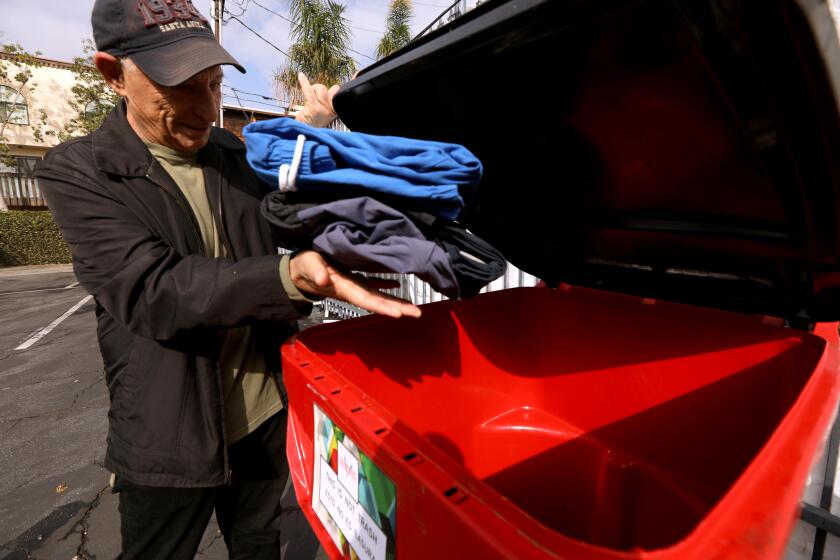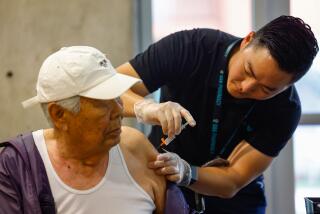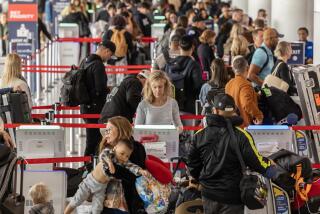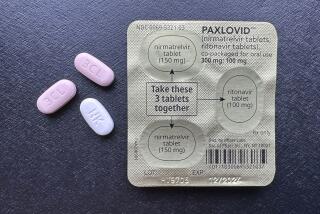Get vaccinated. Stay calm. It’s looking like we all might get COVID someday
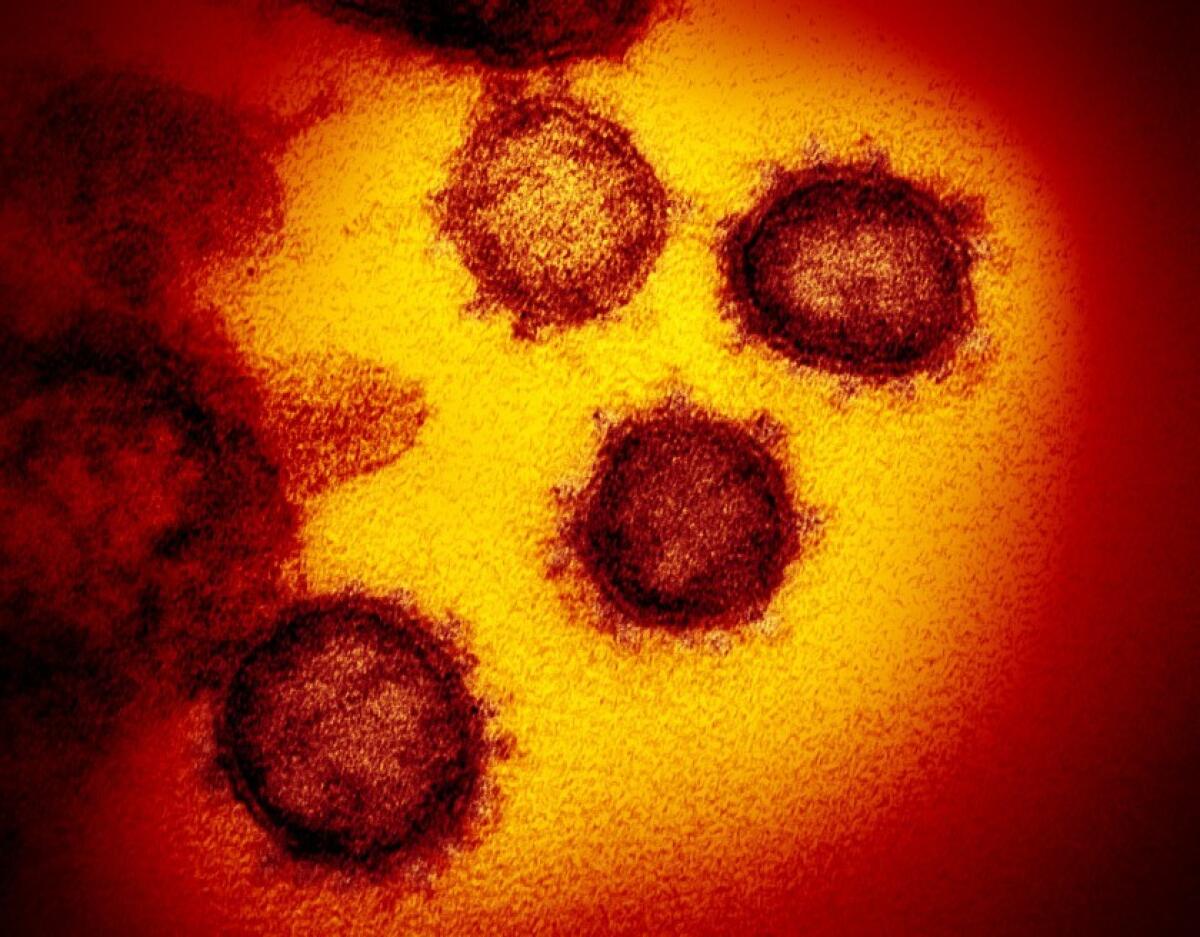
- Share via
Over the last few weeks, you’ve probably had the same conversation I’ve been having:
“We’re all going to get it, aren’t we?”
“Yep.”
Call it fatalism. Call it acceptance. Call it mental preparation.
With the Omicron variant of COVID-19 ripping its way around the world, it’s just a matter of time before we all are exposed to COVID.
On Wednesday, CDC Director Rochelle Walensky said the number of new cases has exploded, as have hospitalizations, and the surge has yet to peak. The good news is that the new variant seems to cause less severe illness and does not appear to attack the lungs as viciously as earlier variants did.
Many of us have gone from knowing a few people who have fallen ill or, sadly, even died from this insidious virus, to hearing daily about friends and family members who have become infected. Most everyone in my circle has been vaccinated; the adults have been boosted. So when they have contracted a breakthrough infection, they feel almost nothing or feel flu-ish for a few days.
Anecdotes are not data, of course, but the way we are experiencing and thinking about COVID has definitely changed.
“Over the next decade, give or take a few years, every single person on Earth has a date with this virus,” Vinay Prasad, a UC San Francisco hematologist-oncologist, wrote last fall.
This seems to be the emerging scientific consensus, though there are skeptics.
“I don’t think it’s a foregone conclusion that everybody will get COVID-19,” UCLA infectious disease expert Otto Yang told the “Today” show last month. “It really depends on the public health response and what we do in terms of vaccination.”
Of course, being exposed to the virus is not the same as becoming infected. Vaccinated people are less likely to become infected if they are exposed and less likely to become seriously ill if infected. As Walensky put it: “Certainly your outcome is going to depend on your vaccination status.... You are 20 times more likely to die from COVID if you are unvaccinated, compared to if you are boosted, 10 times more likely to be a case if you are unvaccinated compared to if you are boosted.”
Please get vaccinated.
A year ago, the journal Nature surveyed more than 100 immunologists, infectious disease researchers and virologists regarding whether they thought the SARS-CoV-2 coronavirus, which causes COVID-19, could ever be eliminated.
Ninety percent said they believe the virus will become “endemic,” meaning that “it will continue to circulate in pockets of the global population for years to come,” according to the Nature article.
“Endemic is now often used to describe the point where the virus’ danger fades to the levels of the flu, or better yet, the common cold,” Sarah Zhang wrote last month in the Atlantic. “A pathogen’s impact becomes a lot more predictable and stable when it’s endemic.”
The Volunteer Collective, an L.A.-based nonprofit, helps people help others, one manageable opportunity at a time.
Last July, President Biden proclaimed, “We’ve gained the upper hand against this virus.” At the time, it appeared we had.
Nevertheless, the virus persisted. The Delta variant emerged in September, then Omicron in November.
Increasingly, we are being told that we are just going to have to learn to live with this thing and figure out how to better manage it so that we don’t experience the cataclysmic shutdowns and disruptions of the pandemic’s first year.
Three public health experts who advised Biden during his transition have urged the president to address this “new normal” by creating a national strategy to cope with living with the coronavirus rather than expecting to eradicate it.
“COVID-19 is here to stay,” wrote oncologist and bioethicist Ezekiel Emanuel, epidemiologist Michael Osterholm and infectious disease specialist Celine Gounder on Thursday in the Journal of the American Medical Assn.
For the sake of a well-functioning public health system, economy and society, specific goals for managing COVID-19 must be established and communicated to Americans, they wrote. That includes creating benchmarks for imposing or relaxing restrictions and rethinking how we will deal with future variants and new viruses.
About half of LAFD firefighters and LAPD officers refuse to vaccinate, for religious or political reasons, and are endangering the people they serve.
Excellent advice, but of course the piece did not get into the insane politicization of everything having to do with the coronavirus, which will certainly present formidable obstacles to executing a national strategy.
However, it did allude to some of our dysfunction, calling for rebuilding “trust in public health institutions and a belief in collective action in service of public health,” which at this point in our recent history seems a little pie-in-the-sky.
What I found most intriguing was their call for a quality that many of us long for in our leaders. “Humility,” they wrote, “is essential.” (How can you possibly read that and not immediately think of the former guy’s bluster at the dawn of the pandemic, which has now infected more than 300 million people worldwide: “You have 15 people, and the 15 within a couple of days is going to be down to close to zero.”)
So much is still unknown about the novel coronavirus; the length of immunity conferred by disease or prior infection, whether antiviral medications can prevent long COVID, whether the bug will become seasonal — or whether deadlier and more transmissible variants will evolve.
Not to mention the likely emergence of yet another novel coronavirus.
More to Read
A cure for the common opinion
Get thought-provoking perspectives with our weekly newsletter.
You may occasionally receive promotional content from the Los Angeles Times.

